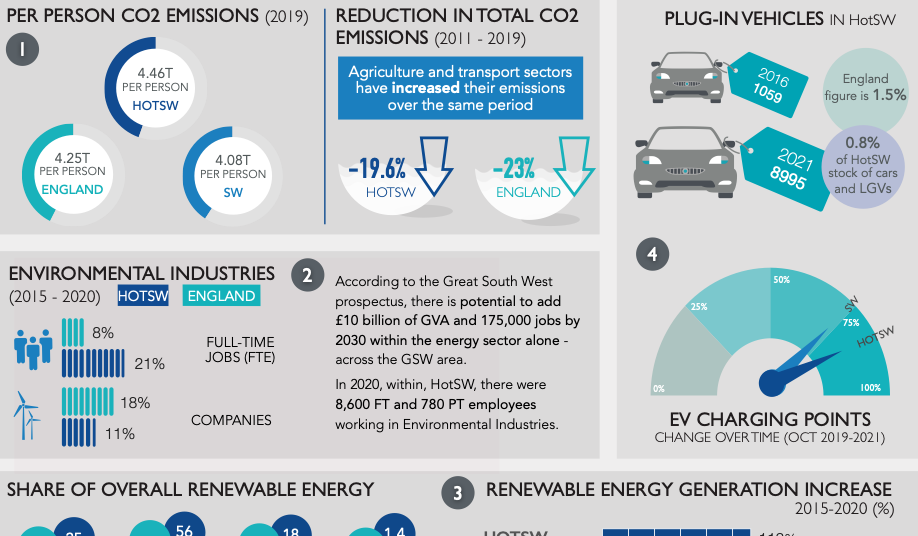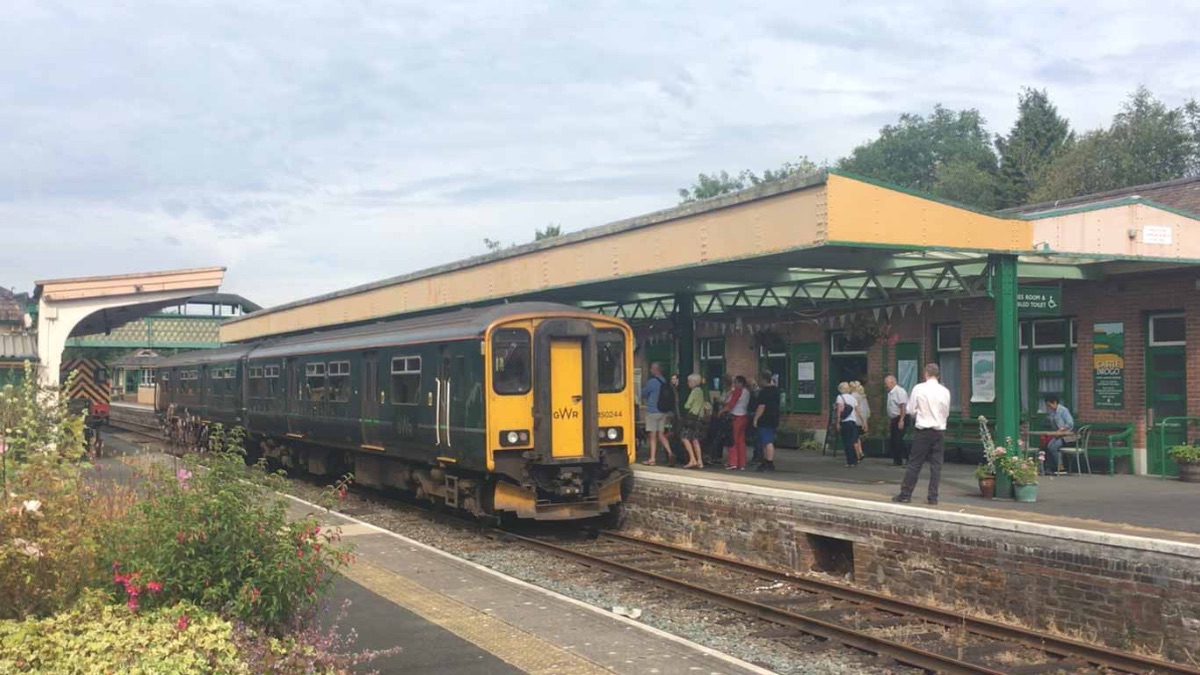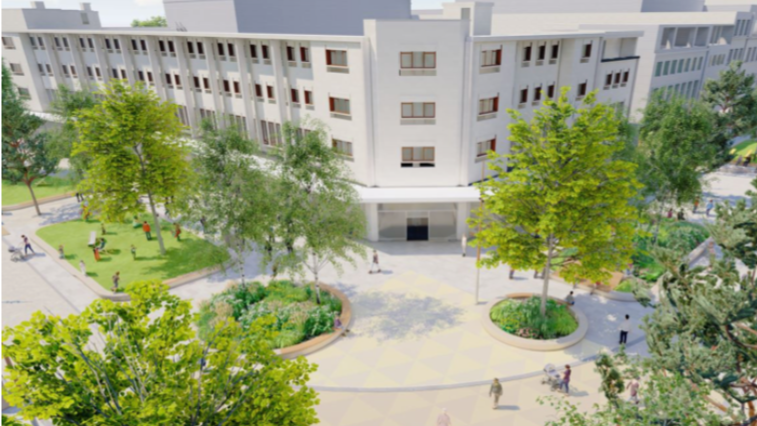Introduction David Ralph, HotSW LEP CEO
 There has been a lot of discussion since COP26 concluded about whether it was a success or not. It was certainly helpful having such a bright spotlight on the challenges and opportunities we face to achieve net zero, and the many events held locally to coincide with COP26 that were supported by BEIS and the SW Energy Hub enabled the conversation in Glasgow to be brought closer to home.
There has been a lot of discussion since COP26 concluded about whether it was a success or not. It was certainly helpful having such a bright spotlight on the challenges and opportunities we face to achieve net zero, and the many events held locally to coincide with COP26 that were supported by BEIS and the SW Energy Hub enabled the conversation in Glasgow to be brought closer to home.
Like Alok Sharma, we want the focus now to be on rapid action. As part of the LEP’s Blueprint for Clean Growth, we signed the Race to Zero pledge to reach net zero in the 2040s or sooner and invited partners to work with us to deliver a range of priorities on energy and transport, for business and communities, and to make the most of our natural capital. Our Build Back Better Plan has clean growth at its heart, and we have formed two programme boards to help accelerate delivery of the sustainable aviation and clean energy ambitions set out in the plan. However, it is also crucial that the transition to net zero does not leave workers and their communities behind and so our work to deliver inclusive growth is also going to be vital.
This has been brought into stark relief by the Centre for Progressive Policy who recently published a new index measuring the economic vulnerability of places as we transition to net zero. While we might have expected heavy manufacturing communities in the North of England and Wales to be highlighted, the index also identifies rural agricultural communities with older populations and relatively low intermediate level qualifications as being vulnerable. Of the 37 highest risk areas in Great Britain, three are in the Heart of the South West – Tiverton and Honiton, Bridgwater and West Somerset, and Torridge and West Devon.
As I said in last month’s newsletter, we are disappointed that overall, we are still woefully short of the level of investment we need to build back better and greener. We hope the Levelling Up white paper when it is published in the next few weeks supports the Heart of the South West’s clean and inclusive growth ambitions and recognises the Great South West as the UK’s natural powerhouse. We will certainly continue to keep the spotlight on our race to net zero, as rural areas such as ours have tremendous potential if provided with the right level of support.
David Ralph
HotSW LEP CEO
Launch of clean growth dashboard

The HotSW LEP has launched an interactive clean growth dashboard to present an up-to-date picture of clean growth in the area and provide key information to help policy makers and business leaders determine the action that needs to be taken to meet net zero targets.
Released to coincide with the end of COP26, the dashboard features a comprehensive analysis of data collated from the LEP’s partners and other organisations across the heart of the south west area.
The resulting indicators suggest that a major shift in pace and scale will be required to meet the region’s clean growth targets.
Historic opening of the Dartmoor Line

For the first time in nearly 50 years, regular passenger services have started running on the Dartmoor Line, connecting Okehampton to Exeter.
The services officially launched on the 20th November, making them the first former line to open as part of the Government’s ‘Restoring Your Railway’ programme.
The route connects Exeter St Davids, Crediton and Okehampton, providing much-needed regional links for people travelling for work, study or leisure. Around half the services will also continue onto Exeter Central.
The reopening of the line was completed ahead of schedule, delivered by the Department for Transport and partners in just nine months.
New sustainability measures for Plymouth's city centre

Work is underway to refresh and revive dated landscaping and introduce improved sustainability measures in Plymouth’s Old Town Street and New George Street.
The dated 1980s landscaping is being replaced with new trees and green spaces, a new play area, places to sit, a small performance area and an ornamental ‘rain garden’. A new sustainable drainage system will mean that rain water will be diverted to water plants rather than going into the sewers.
The work forms part of Plymouth City Council’s multi-million pound investment into a key part of the city centre and has been supported with £700k from the HotSW LEP.
Overcoming the challenges to clean propulsion solutions for marine vessels
How to accelerate the development of commercially viable clean propulsion solutions for marine vessels with engines operating between 500-7,500 horsepower was the topic of discussion at an event funded by the Department for Transport this month between Maritime UK, the Society for Maritime Industries and Knowledge Transfer Network.
Over 40 leaders from across the industry attended the event in London, including buyers of marine propulsion units, engine manufacturers, research and government officials, to explore possible solutions. Parliamentary Under-Secretary of State for Transport, Robert Courts MP, provided a video address to the delegates.
Why we need to pick up the pace on decarbonising transport
What should be the priorities for carbon reduction of transport in the South West? According to the HotSW LEP’s expert on transport, Ian Harrison, we need to pick up the pace. That means there should be a focus on delivering smaller schemes and initiatives, which can be delivered quicker than big projects.
SW food-related businesses needed for supply chain study
A major new project to map the South West’s food supply chains will identify opportunities to improve the system for people, place and planet. The aim of the research is to lead to a reduction in food miles, better deals for farmers and greater amounts of local food bought and consumed.
Researchers from the University of Exeter’s Centre for Rural Policy Research will investigate the food products that public institutions such as hospitals and schools buy and how frequently. Farmers and food producers will also be interviewed to understand what is produced in the region throughout the year.
The research team want to speak to people involved in food supply and production including farmers, those involved in food storage and processing, large wholesalers and public sector organisations.
Nuclear summit focuses on supply chain solutions
Following publication of the Government’s Net Zero Strategy in October 2021, and the significant role that new nuclear will play in achieving carbon net zero, the HotSW LEP’s nuclear sector lead, Corinne Matthews, attended the Nuclear Manufacturing Summit on 16 and 17 November.
Held at the University of Sheffield’s Nuclear Advanced Manufacturing Research Centre, the Summit’s discussion themes explored how manufacturers involved in the construction of nuclear plants can work together to innovate and develop solutions to overcome the challenges of lengthy lead times and high expense to getting more reactors onstream.


